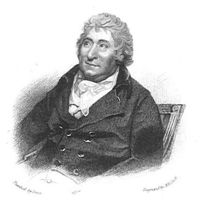Annotation:Jack's Gratitude: Difference between revisions
No edit summary |
No edit summary |
||
| Line 6: | Line 6: | ||
<br> | <br> | ||
<br> | <br> | ||
The first couple of stanzas of the song go: | |||
<blockquote> | |||
''I've sail'd round the world without fear or dismay,'' <br> | |||
''I've seen the wind foul, and I've seen the wind fair, ''<br> | |||
''I've been wounded, and shipwreck'd, and trick'd of my pay,''<br> | |||
''But a brave British sailor should never despair.'' <br> | |||
<br> | |||
''When in a French prison I chanced for lie,''<br> | |||
''With no light from the heavens, and scarce any air,''<br> | |||
''In a dungeon, instead of in battle, to die,''<br> | |||
''Was dismal, I own, but I did not despair.''<br> | |||
</blockquote> | |||
</font></p> | </font></p> | ||
<p><font face="garamond, serif" size="4"> | <p><font face="garamond, serif" size="4"> | ||
Revision as of 02:19, 30 June 2013
Back to Jack's Gratitude
JACK'S GRATITUDE. English, Air (2/4 time). D Major. Standard tuning (fiddle). One part. "Jack's Gratitude" was a song by Charles Dibdin [1] (1745-1814), known for his sea-songs.

The prolific Dibdin (born at Southampton) was one of the most popular English composers of his era, whose operas were regularly performed in London theatres including Salder's Wells, Covent Garden, Drury Lane and the Haymarket, and his own venue Sans Souci on the Strand.
The first couple of stanzas of the song go:
I've sail'd round the world without fear or dismay,
I've seen the wind foul, and I've seen the wind fair,
I've been wounded, and shipwreck'd, and trick'd of my pay,
But a brave British sailor should never despair.
When in a French prison I chanced for lie,
With no light from the heavens, and scarce any air,
In a dungeon, instead of in battle, to die,
Was dismal, I own, but I did not despair.
Source for notated version:
Printed sources: Aird (Selection of Scotch, English, Irish and Foreign Airs, vol. 4), 1796, No. 196, p. 73.
Recorded sources:
